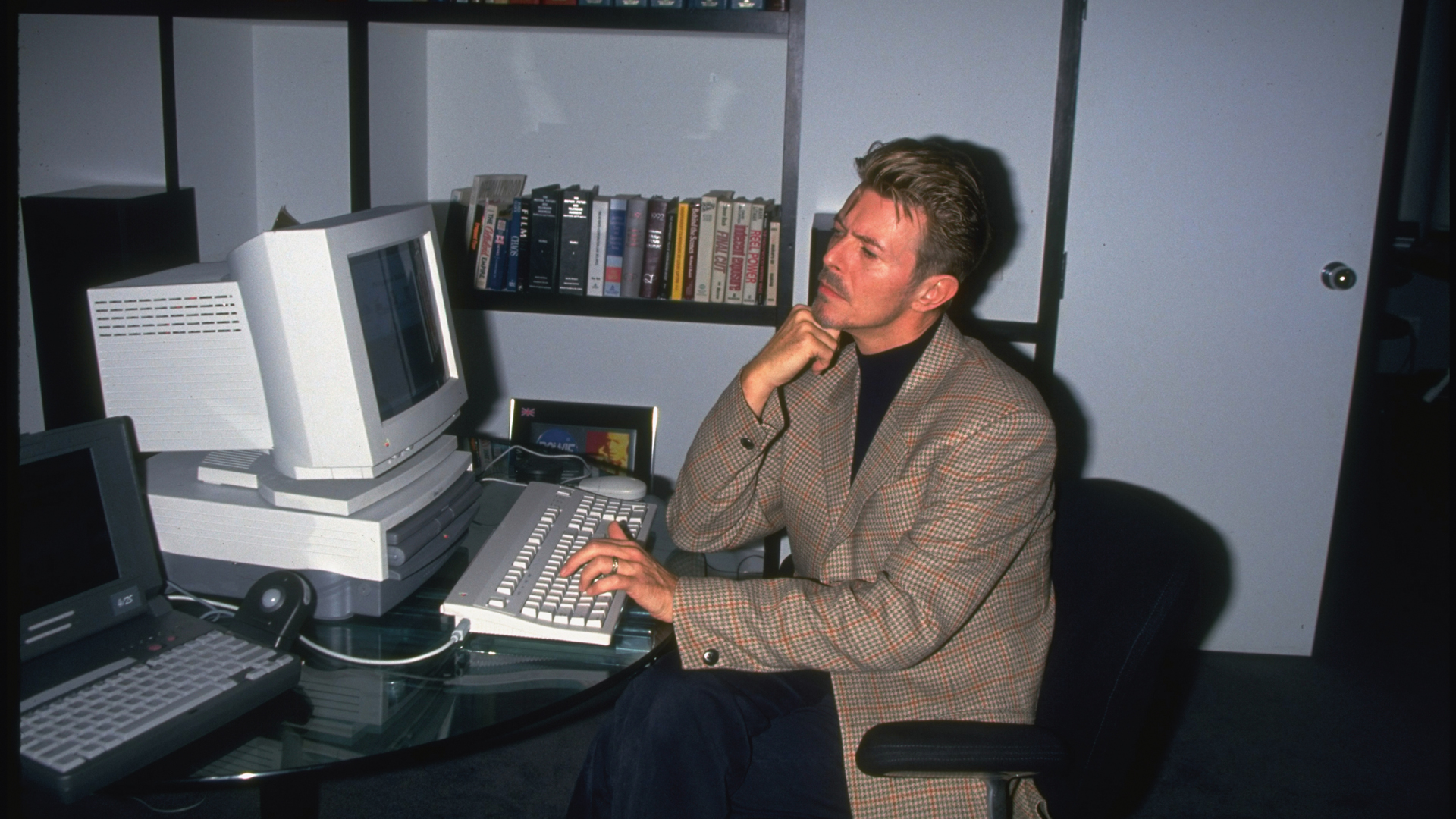He relishes the anonymity of cyberspace, where he can indulge his whimsy for silly names. When asked about his favourite sites, he’s as puerile as most other net addicts.
“I’m the first one to pop off to Slap a Spice Girl or Punch a Hanson,” he giggles. “And I really like the site called virtual autopsy. You get to take an entire body apart,” he adds with gusto, before suddenly changing tack when he realises how this might sound. “But there are some nice serious ones as well. My missus told me to go and look at 10 Downing Street, which is very good,” he says in a mockingly stern tone.
In recent years Bowie has shown himself to be the most financially astute of rock stars, catapulting himself to the top of the list of wealthy pop stars with some cunning marketing. Last year he issued bonds on the stock market on the basis of sales of his back catalogue – which put £30m in his pocket. BowieNet has already been valued at £300m, although, like many internet-based businesses, it’s not generating any profits. “It won’t even keep me in cigs,” he says.
Even so, this is just the sort of thrusting entrepreneurial spirit that’s led to invitations to dine at Number 10 with the Blairs. There, Bowie argued – among other things – about the merits of political websites. “I told Blair that I didn’t like the Labour site, that it’s still stodgy,” he says.
So where is the artist in all this? “It doesn’t affect me as Jonesy,” says Bowie, referring to the name – David Robert Jones – he was born with. “Bowie was always a poster boy. He’s this thing that goes out there in the entertainment world, and Jonesy can stay at home.
“Anyway, I have this very ambivalent feeling about the public figure/private figure idea. I really don’t give a fuck. The site doesn’t present itself as a marketing tool for my records, and I don’t want to ever reduce it to that.”
Advertising helps fund Big Issue’s mission to end poverty
While he released the single Telling Lies last year exclusively through the internet, his latest venture – offering a fan the chance to co-write a song with him through BowieNet – has run into trouble with a hacker who’s been rigging the result. “But I know who it is. I’ve got his number,” says Bowie with a mischievous laugh.
Unlike many of the corporate predators on the internet, Bowie seems to have much the same attitude as the average user. Whereas online music cops now exist to track down pirated recordings and unofficial sites, Bowie is happy to see them flourish.
“I am absolutely not into shutting them down. In fact, quite the reverse,” he says. “I like the idea of a network community. If I was 19 again, I’d bypass music and go straight to the internet. When I was 19, music was still the dangerous communicative future force, and that was what drew me into it. But it doesn’t have that cachet any more. It’s been replaced by the internet, which has the same sound of revolution to it.”
For rock stars, the cyberspace revolution has provided a way to bypass the chicanery of the record business hierarchy. Although Bowie is not the first to look at ways around the record companies, he has been the most astute. Prince escaped the clutches of a major label, launched his own, and bypassed the entire record company process by selling his albums directly on the internet – but he now sells far fewer records. And last month Public Enemy’s Chuck D was stopped from releasing tracks online by record company bosses – although he notched up credibility points for his stand against them.
Yet Bowie has gained real kudos for his internet initiatives. Computerworld, America’s leading computer magazine, listed him in its top 25 innovators for 1999. He was the only entertainment figure on the list. With his new-found financial clout, Bowie could become more of a force as a businessman than as a pop star. Yet he is also talking about resurrecting Ziggy Stardust this year in a multimedia project incorporating a film, a CD, the net and a stage show.
The 51-year-old says he’s online for the first few hours of every day, and logs on to ‘chat rooms’ about four times a week, lured by the humorous exchanges as much as anything else
His old fans would certainly welcome the return of the stilettos, make-up and frocks from the heyday of glam. Many were surprised that he didn’t come up for air during last year’s glam revival, centred around Todd Haynes’ film Velvet Goldmine, which unashamedly drew on Bowie and Iggy Pop as its role models.
Advertising helps fund Big Issue’s mission to end poverty
So what did he think about glam being big again? “Was it really?” he says in his campest ‘Suits you, sir’ voice. “I felt that was a synthetic recycling on the back of the belief that Velvet Goldmine would be a smash movie and be able to sell all those spin-off books and records.
“When I saw the film I thought the best thing about it was the gay scenes. They were the only successful part of the film, frankly. It didn’t understand how innocent everyone was then about what they were getting into,” he says, before pausing for a moment. “Also, there was a lot more shopping – trawling round Liberty’s looking for fabric. It was hysterical.”
Almost as funny as Bowie’s own cyberspace odyssey, which has seen him transformed from a man who spent a good deal of the Seventies totally wired on cocaine to one who’s just plain wired in 1999.
This interview was originally published on January 11 1999









